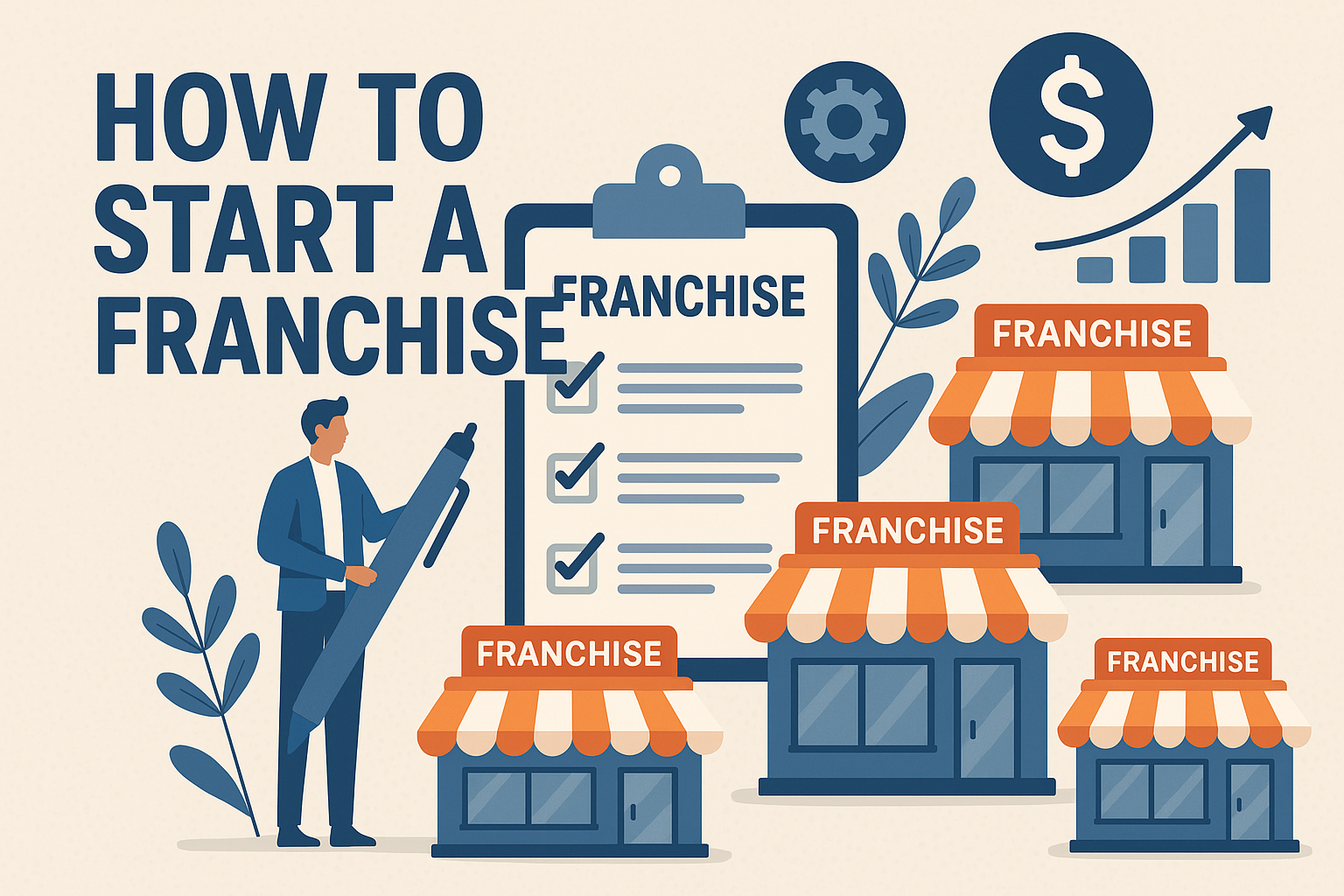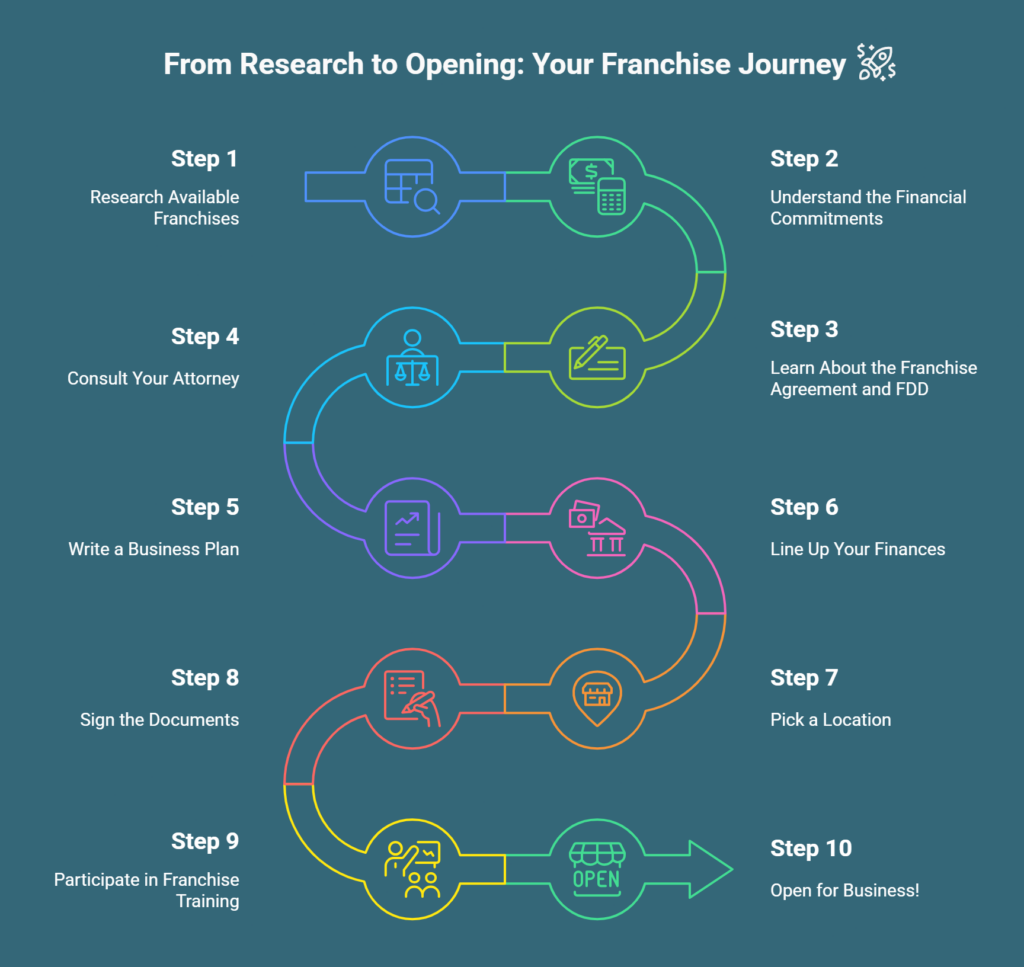Ready to Embark on an Exciting Journey with WIN?
Take the first step toward personal and financial freedom by filling out the interest form. One of our franchise advocates will be in touch with you soon!

Every employee, at one time or another, has thought about owning their own business. When the 9-to-5 feels like too much, being your own boss can sound pretty good. However, for most Americans, worry and uncertainty creep in and it becomes easy to talk yourself out of the dream. After all, you need a lot of money to start a business, and what if it fails? Who do you turn to when you have questions?
But what if there was an easier way to own a business? One that took out some of the financial implications and risks? For many entrepreneurs, starting a franchise is the answer.
Franchising can be a great way to break out of a rut and start enjoying the satisfaction and flexibility of business ownership. But how do you get started? This step-by-step guide will walk you through everything! If you’re completely new to business ownership and the world of franchising, we’ll break down everything you need to know (from common vocabulary to important documents) and share the 10 steps for starting a business.
A franchise is a business agreement in which one party (the franchisor) grants a license to a separate party (the franchisee). The franchisee opens a local business using the franchisor’s brand, products, and business model, among other things. In exchange for using the franchisor’s brand name, support team, and resources, the franchisee usually pays an upfront fee and ongoing royalties to the franchisor.
As a franchisee, you start your own business with the advantage of the franchisor’s recognizable brand name. In fact, many of the companies and restaurants you enjoy today are likely franchises! This helps reduce the risk you take on as an entrepreneur. In addition, a franchisor will usually provide the franchisee with training and support to help ensure business success.
For many new business owners, being backed by a franchise gives them the confidence they need to succeed. However, there are many other benefits to franchising, including:
Now that you’re familiar with franchising and its benefits, you’re ready to learn how to start your own franchise.

Like with any business, you first need to decide what business you want to be in. When you start looking into franchising, you’ll find lots of opportunities- from almost every business type and industry. As you research the options further, look for those with business models that appeal to you and industries that are expected to grow. Prioritize opportunities where the franchisor provides comprehensive training and ongoing support to help ensure your new business will succeed.
Evaluate the financial commitments required for each franchise on your shortlist. Be sure you have the capital or qualify for a business loan. Ongoing royalties are likely to be different for each franchise, too.
To help you assess each franchise, consider each of these three categories:
At this point, your shortlist has likely narrowed down to one or two franchises you’re really interested in. Now, it’s time to learn about your responsibilities as a franchisee.
For most franchise opportunities, there are two important legal documents: the franchise agreement and the franchise disclosure document (FDD).
The franchise agreement defines the relationship between the franchisor and the franchisee. It details the rights and obligations of both parties. Because each franchise is different, each franchise agreement will cover various points. However, most agreements have similar clauses, such as the territory or geographic area where the franchisee is authorized to operate. Another standard clause covers the contract’s duration and renewal options.
The FDD also contains information the franchisor must legally disclose to the franchisee. This includes details about the franchisor’s background and any pre-existing legal or financial issues. While disclosure requirements vary by location, most FDDs clearly outline all fees franchisees must pay, including initial franchise fees, royalties, advertising fees, and other ongoing expenses.
While the franchise agreement and FDD are usually easy to read and understand, they are binding legal documents. If you enter into a franchise agreement, these documents cover your rights and responsibilities as a business owner. Therefore, it’s essential to consult your attorney, as they can help you understand the real-world implications of signing these documents.
Whether you’re starting your own company from scratch or opening a franchise, you need a business plan. This document can require a lot of research, but it’s worth the effort. A detailed business plan covers everything about your new undertaking, including:
Most business plans begin with an executive summary, which is a short overview of the rest of the plan. From there, provide as much detail as you can. Franchisors often help develop business plans based on past franchisee experiences.
At this point, you should clearly understand your financial obligations as a franchise owner. If you already have the necessary funds, you’re good to go. Otherwise, you may want to secure a business loan. Your business plan will help with approval since it shows you’ve done your homework and have a good idea of your franchise’s expected revenue and profitability. Make sure you also have enough to cover living expenses until your franchise starts to generate revenue and become profitable.
While the franchise agreement will define the territory your business will cover, be sure to pick a location within that region that makes sense. Consider proximity to your expected customer base, zoning regulations, rental costs, and nearby competition. Also, make sure your new business won’t be too far from your home so you don’t have to add a long commute to your daily routine. Some franchises allow you to work out of your home, eliminating the expense and upkeep of managing a storefront.
With most preparatory steps complete, it’s time to make it official. Sign the franchise agreement, FDD, and any other necessary documents. Remember the business licenses and other requirements in your city and state. Once all that paperwork is signed, you’re a business owner! Congratulations!
Most franchisors provide training programs that help new franchisees get started. Standard training often includes courses on operational procedures, advertising, and marketing your business. Other franchisors will offer more comprehensive, ongoing training online and in the field. These extra training programs might include courses for business skills, industry technology, and customer service.
Now you’re almost ready to make your new business your job. To open for business, arrange for utility services (electricity, internet, phones, etc.), and advertise the grand opening in local media. Your franchisor can help with marketing plans to ensure you start reaching customers right away.
» Also Read: Are Franchises a Good Investment?
After deciding to become a franchise owner, your most challenging step might be finding the best type of business for you. Market trends come and go, but the best franchise businesses are always in demand. Home inspection services never go out of style, as the real estate industry continues to experience growth year over year.
WIN Home Inspection has a national presence and was ranked number one in the home inspection services industry for the third year in a row by Entrepreneur Magazine. WIN was also recognized as one of the top franchises in the country in Entrepreneur’s Franchise 500 List. Each franchisee receives comprehensive training, including technical inspection skills, business management, and marketing courses. To learn more about WIN’s proven business model and low-cost franchise opportunities, contact WIN Franchising today.